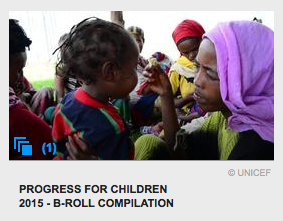A report by the UN Children's Fund (UNICEF) on the achievement of child-related Millennium Development Goals (MDGs) has concluded that despite significant achievements, unequal opportunities have resulted for millions of children that die before they turn five, live in poverty, lack access to schooling and suffer from chronic malnutrition.
In future efforts to achieve the proposed Sustainable Development Goals (SDGs), the report recommends focusing on the most disadvantaged of children and those that have been left behind.
 23 June 2015: A report by the UN Children’s Fund (UNICEF) on the achievement of child-related Millennium Development Goals (MDGs) has concluded that, despite significant achievements, unequal opportunities have resulted for millions of children who die before they turn five, live in poverty, lack access to schooling and suffer from chronic malnutrition. In future efforts to achieve the proposed Sustainable Development Goals (SDGs), the report recommends focusing on the most disadvantaged of children and those who have been left behind.
23 June 2015: A report by the UN Children’s Fund (UNICEF) on the achievement of child-related Millennium Development Goals (MDGs) has concluded that, despite significant achievements, unequal opportunities have resulted for millions of children who die before they turn five, live in poverty, lack access to schooling and suffer from chronic malnutrition. In future efforts to achieve the proposed Sustainable Development Goals (SDGs), the report recommends focusing on the most disadvantaged of children and those who have been left behind.
‘Progress for Children: Beyond Averages’ concludes that “we were not ambitious enough” to reach those children with the greatest needs. Still, the report highlights progress, including 2.6 million people gaining access to improved drinking water sources, a 41% decrease in chronic malnutrition among children under five, and a 45% decrease in maternal mortality. In addition, gaps between the richest and the poorest have narrowed in more than half of the indicators analyzed by UNICEF.
The report also underscores how the broad global goals of the MDGs “inadvertently encouraged nations to measure progress through national averages,” resulting in a rush to make progress that contributed to a focus on the easiest-to reach children and communities rather than those with the greatest needs. It cautions that, in pursuing this approach, “national progress may actually have been slowed.” For example, while the number of children not participating in primary education decreased from 104 million in 1990 to 58 million in 2012, the poorest children are five times more likely to lack access to primary education than the richest children. Similarly, children from the poorest households are twice as likely to die before their fifth birthday as children from the richest households.
To ensure that the most disadvantaged children are at the heart of the post-2015 development agenda, the report recommends an “equity-focused approach,” including: better data collection and disaggregation to identify the most excluded and vulnerable children and where they live; smarter investments tailored to the needs of the most vulnerable; and stronger local education, health and social protection systems.
“The SDGs present an opportunity to apply the lessons we have learned and reach the children in greatest need,” UNICEF Executive Director Anthony Lake said. “For greater equity in opportunity for today’s children means less inequality and more global progress tomorrow.” [UN Press Release] [UNICEF Press Release] [Publication: Progress for Children: Beyond Averages: Learning from the MDGs]